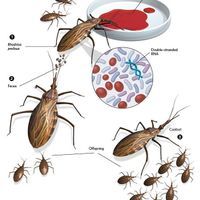To control reproduction in Rhodnius prolixus, which spreads Chagas disease, researchers introduce double-stranded RNA via bacteria mixed into the insect’s food. The blood meal contains commensal gut microbes that have been genetically engineered to express the RNA, which blocks the expression of a gene involved in producing offspring (1). Such RNA interference can spread to other individuals who eat the treated insect’s feces (2). Control animals produced roughly 70 percent more offspring than treated ones (3).
 © GEORGE RETSECKRead the full story.
© GEORGE RETSECKRead the full story.
Interested in reading more?

The Scientist ARCHIVES
Become a Member of
Receive full access to more than 35 years of archives, as well as TS Digest, digital editions of The Scientist, feature stories, and much more!
Already a member?




